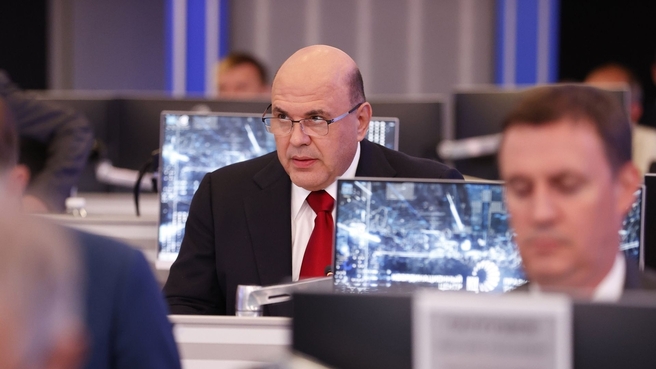Mikhail Mishustin: “With regard to a number of goods, primarily, grain, sugar, vegetable oil, meat and fish, the Food Security Doctrine is being implemented at a pace that exceeds the earlier objectives. Importantly, though, we must maintain this pace despite the sanctions that have impacted our agricultural producers.”
Mikhail Mishustin’s opening remarks:
Good afternoon.
We will use this strategic session to discuss agriculture and food security.
At a recent meeting, the President made clear that providing the domestic market with basic foods is our top priority.
We are working towards this end guided by the Food Security Doctrine, among other things. With regard to a number of foods, primarily, grains, sugar, vegetable oil, meat and fish, the Food Security Doctrine is being implemented at a pace that exceeds the earlier objectives. We are moving forward in a number of other positions as well. Importantly, though, we must maintain this pace despite the sanctions that have impacted our agricultural producers.
To help farmers successfully finish the sowing campaign, the Government has set aside an additional 200 billion roubles for low-cost loans.
Expanding our own production capacity for seeds, veterinary medicines and breeding material, agriculture machinery and food and processing industry equipment is another priority. According to preliminary estimates, the first results of this effort, including Russian- and Belarusian-made agricultural machinery and domestic seeds, can be expected two and a half years from now.
Now, exports.
Interest in agricultural products from Russia was quite high before as well. As of the end of last year, agricultural and fishery exports amounted to over $37 billion. Now that global food inflation is on the rise, demand has increased by orders of magnitude. You read the media reports and are aware of how things are.
We know how important it is for our agricultural producers to be able to access international markets. However, the situation must be taken into account when doing so. It is no coincidence that the President focused on honouring our obligations to our traditional permanent partners.
Here, much depends on how quickly the basic financial and insurance tools, including an increase in rouble transactions for agricultural exports, primarily with friendly countries, will be developing.
Last week, the Bank of Russia approved the first Russian commodity index for wheat, which is calculated daily after the markets close. This is an important benchmark for improving grain market transparency, mitigating risk, resolving current issues and obtaining a more objective information picture without being pegged to foreign exchange indices.
A liquid agriculture commodity market will also make it possible to increase the volume of trade in wheat and sunflower oil and bring them up to 10 percent by 2023, and for roubles.
I will spend a moment discussing labour, which is a sensitive issue for the agricultural industry. There is a shortage of young trained specialists. Efforts should be made to not just bring them to rural areas for a limited time, but to create an environment that will encourage them to stay longer, build their lives there, raise children and tie their futures to these places.
We have a government programme for developing rural areas. Housing is being built that can be bought with low-cost loans. There are more new schools and rural health clinics. Community centres are being renovated, and new athletic grounds are being built. Of course, much remains to be done. A lot depends on the regions and their willingness to invest in building rural infrastructure.
Colleagues, before we move to the discussion, please be mindful of the current risks in your remarks, as the President made clear, including in the medium and longer term.












